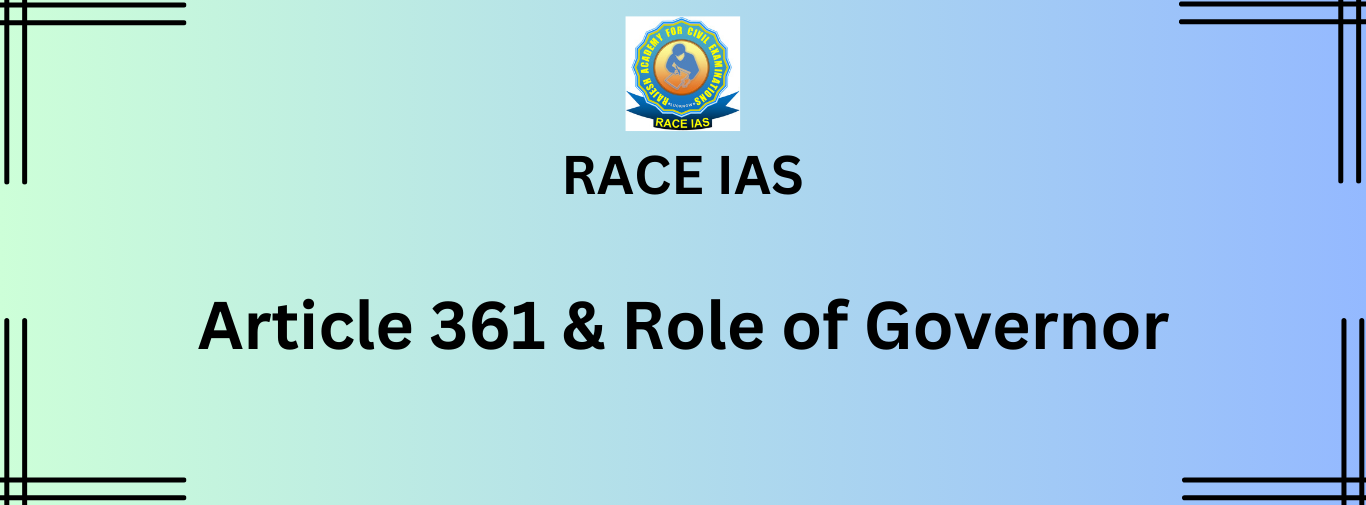
Article 361 & Role of Governor
Article 361 & Role of Governor
GS-2: Indian Constitution
(IAS/UPPCS)
Relevant for Prelims:
Role of the Governor, Part 19, Article 361, Article 61, Rameshwar Prasad v. Union of India (2006).
Relevant for Mains:
Key provisions related to Article 361, Controversy related to the role of Governor in India, Way forward.
Source: IE
04/05/2024
Why in news:
- Recently, Article 361 of the Indian Constitution is in discussion amid the complaint of sexual harassment against the Governor of West Bengal.
About Article 361:
- This article is mentioned in Part 19 of the Indian Constitution. This article provides special protection from court proceedings to the President, Governors, and Princes during their tenure in office.
- The Governor, President or Head of State of any State shall not be liable to any court for anything done or likely to be done by him in the exercise and performance of the powers and duties of his office.
- Article 361 makes it clear that the conduct of the President can be reviewed by any court, agency or body appointed or designated by either House of Parliament to investigate the charge under Article 61. Provided further that nothing in this clause shall be construed to restrict the right of any person to institute appropriate proceedings against the Government of India or the Government of any State.
- No criminal proceedings of any kind shall be instituted or maintained in any court against the President or the Governor of any State during his term of office.
- No process shall be issued in any court for the arrest or imprisonment of the President or the Governor of any State during his term of office.
- Civil proceedings against a Governor or the President for actions taken in his personal capacity can be taken only with 2 months' prior notice.
Features of this Article:
Exemption from liability:
- The President, Governors and Princes are not liable to any court while exercising the duties and powers of their office. This provides them with a level of protection in their work.
Allegation Investigation:
- However, under Article 61, the conduct of the President can be reviewed by a court, agency or body appointed by either House of Parliament.
Proceedings against the government:
- This rule does not imply that it restricts the right of any person to institute proceedings against the Government.
Stay on criminal proceedings:
- No civil proceeding can be instituted or continued against the President or the Governor during his term of office. This privilege protects them from court campaigns, so that they can carry out their responsibilities without fear.
Protection from arrest and imprisonment:
- During his term of office, no process can be issued by the court for his arrest or imprisonment. This privilege provides them with the security of personal freedom.
Related Supreme Court Decision:
Rameshwar Prasad vs. Union of India (2006):
- In this case, the Supreme Court has provided relief to the Governor in the context of the allegation made in the form of personal malice.
- According to the Supreme Court, the interpretation of Article 361 is a subject of legal scrutiny.
- The Supreme Court of India has emphasized that the immunity provided under Article 361 is not absolute.
- The conduct of the President may be reviewed by any court, tribunal or body appointed or nominated by either House of Parliament to investigate any charge.
Role of Governor in India:
- The role of the Governor is described in Articles 153 to 162 of the Indian Constitution.
- The Governor plays an important role in the functioning of a democratically elected government.
- The role of the Governor in the state is almost similar to that of the President of the country.
- The Governor is the formal head of the state and all actions of the state are taken in his name.
- The Governor of each state is appointed by the President on the recommendation of the Union Cabinet of the country and he works on the advice of the Chief Minister of the state.
- It is noteworthy that the role of the Governor has been the most controversial for the last five decades.
- Dispute related to the post of Governor
- Allegations of sexual abuse
- Accusation of bias
- Allegation of violation of model code of conduct
- Allegation of misuse of discretionary powers
Way forward:
- Several reforms should be made in the provisions related to the appointment of governors and their tenure.
- The recommendations of the Rajamannar Committee constituted in 1970 regarding improvement in the appointment process should be implemented.
- Decisions taken by governors and allegations against them should be subjected to judicial scrutiny, including the sources used to reach those decisions.
- The powers and prerogatives associated with the office of the Governor must be coupled with accountability and transparency.
- To enable the Governor to discharge his duties successfully, an 'agreed code of conduct' approved by the State Governments, the Central Government, Parliament and State Legislatures should be developed.
- The discretionary powers of the Governor should be curbed and there should be proper guidelines regarding the appointment of the Chief Minister.
-----------------------------------------------------------------------
Mains Exam Practice Question
Mention the way forward in settlement of disputes related to the role of the Governor in the light of Article 361.